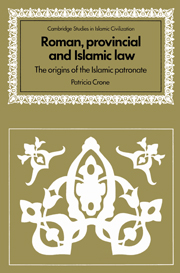3 - The Islamic patronate
Published online by Cambridge University Press: 16 October 2009
Summary
Introductory
The institution with which this book is concerned regulated the status of freedmen and converts in early Islamic society. All societies must have a policy regarding the admission of outsiders to their ranks, and since slaves are usually recruited abroad, freedmen and other foreigners have often been governed by the same or similar rules from this point of view. Both pose the question whether they should be admitted at all. The answer to this question has sometimes been no. Thus the Athenians withheld citizenship from freedmen and other foreigners alike, assigning the status of metic, or resident alien, to both. But in societies constituted by common faith, adoption of this faith will normally result in the acquisition of membership, however partial at first. Jewish law accords practically the same rights and duties to freedmen and other proselytes as it does to born Jews; and Islamic law similarly grants full membership of the Muslim community to freedmen and converts, some minor disabilities apart: only the dhimmīs, that is the non-Muslim subjects of the Muslim state, are in the position of metics. There is no reason to think that Islamic law ever circumscribed the rights of freedmen and converts in public law, though the Arab conquerors frequently treated them as second-class citizens in practice. But however this may be, this aspect of the question is not of interest to us.
- Type
- Chapter
- Information
- Roman, Provincial and Islamic LawThe Origins of the Islamic Patronate, pp. 35 - 42Publisher: Cambridge University PressPrint publication year: 1987

